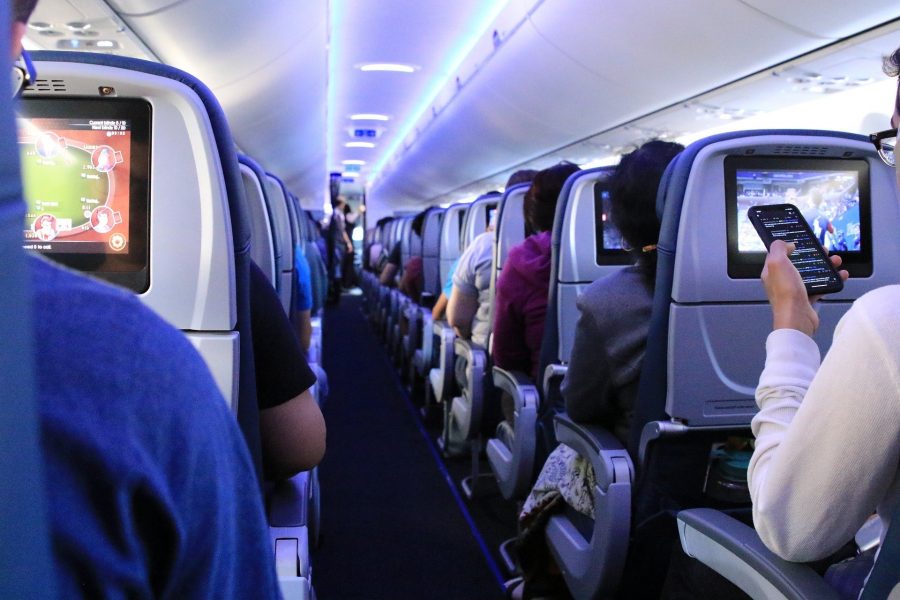US history shows that not enough has been done to achieve Muslim equality
February 5, 2021
President Joe Biden repealed the United States’ ban on flying to or from the majority-Muslim countries of Iran, Iraq, Libya, Somalia, Sudan, Syria and Yemen on Jan. 20.
Although this act is a major step toward treating Muslims as equals to other citizens, it is a bandage solution, and more needs to be done.
Former U.S. President Donald Trump signed the initial Muslim ban in 2017. Throughout his presidency, he continually faced lawsuits over it.
Court after court blocked his ban because it violated the Constitution’s protection of people’s First Amendment freedom of religion.
With every block, Trump expanded his list to make it appear that he was not solely focusing on Muslim countries, but the ban was still called the Muslim ban.
The intent behind it had not changed as the countries remained on the list. In fact, he ended up releasing three different versions of a Muslim bill.
The Supreme Court ultimately found his order to be constitutional in the case of Trump v. Hawaii. Chief Justice John Roberts was in favor of it and explained that it was within the power of the president to keep out foreign citizens.
It is notable that, in the same case, Roberts said the following in regard to Korematsu v. United States, a case that paved the way for Japanese internment camps.
“The forcible relocation of U.S. citizens to concentration camps, solely and explicitly on the basis of race, is objectively unlawful and outside the scope of Presidential authority,” Roberts wrote. “But it is wholly inapt to liken that morally repugnant order to a facially neutral policy denying certain foreign nationals the privilege of admission.”
He argued that the Supreme Court had been wrong in their decision in 1942, yet his reasoning hinged on the internment camp’s intent to target a race. The hypocrisy is truly potent then, considering that Trump’s ban intent was to target a religious group.
Muslims in the United States have been subjected to treatment as terrorists and people who shouldn’t be trusted. Many think that this dates back to 9/11, but the problem goes further and deeper than that.
It started with the Arab American population.
In the 1970s, an oil embargo from the Middle East on the United States trickled down from the macro-level of impacting the economy to the micro-level of citizens waiting in long lines at gas stations.
As a result, people took their anger out on Muslims, following the misconception that all Arabs and all Middle Easterners are Muslim.
The image of Muslims as the enemy was spread through the media, as “major news outlets sketched caricatures of Arabs as rich oil ‘sheiks’ bent on world domination,” according to Vox.
That same decade also showed former U.S. President Richard Nixon placing travel restrictions on Arab Americans.
In 1972, the Palestinian group Black September attacked Israeli athletes during the Olympics. As a response, Nixon had the FBI, CIA, Secret Service and other investigative agencies form a committee to fight terrorism.
Ultimately, that committee and its work known as Operation Boulder, under the pretense of national security, harassed and discriminated against Arab Americans.
The government started by cracking down on immigration for Arab Americans suspected of terrorism, but that quickly became widespread across the entire ethnic group.
Then, the government’s tactics escalated to include wiretaps, interrogating innocent people and even deporting people because of minor errors that had not been seen before their visas were approved.
The United States was acting like if any threat came to America, it would solely be from Arab Americans. Due to its paranoia and prejudice, the nation blurred the lines between treating innocent people as citizens and treating them as villains.
Susan Akram, a legal scholar, said that Operation Boulder was “perhaps the first concerted U.S. government effort to target Arabs in the U.S. for special investigation with the specific purpose of intimidation, harassment and to discourage their activism on issues relating to the Middle East.”
Nixon’s past actions are relevant because they follow the same logic of the travel ban.
By saying that it was for the nation’s protection, Nixon corralled and discriminated against a group of people. Trump, also under the guise of national security, discriminated against countries because of their predominant religion.
As the new decades rolled in, violence and discrimination against Muslims remained prominent, but Muslims also were growing to be more accepted.
The Iran Hostage Crisis particularly evoked ire among Americans toward Muslims in the beginning of the 1980s, but by the mid-1990s, it was counteracted with a powerful force: music.
Islam became more familiar and understood, especially to the youth, as musicians touched on it in hip-hop.
In fact, even non-Muslims began to add “peace” to the end of their songs, just as Muslims wish each other peace when they greet and leave each other, according to WNYC News.
Any progress made in the ‘90s, however, faded away with 9/11.
Former U.S. President George W. Bush’s administration insisted that the country was not at war with Muslims.
“America treasures the relationship we have with our many Muslim friends, and we respect the vibrant faith of Islam which inspires countless individuals to lead lives of honesty, integrity and morality,” Bush said.
While he continued to give speeches insisting that Muslims were neither enemies nor extremists, Muslims in the nation felt the true stinging aftermath of the events.
The people’s perceptions of Muslims was so wrong that an innocent Sikh man, Balbir Singh Sodhi, was shot outside of a gas station because his murderer thought he was Muslim.
While Bush was giving speech after speech talking about how peaceful Muslims were, the FBI and law enforcement were targeting Muslims, South Asians and Arabs.
The Uniting and Strengthening America by Providing Appropriate Tools Required to Intercept and Obstruct Terrorism, or USA PATRIOT Act, was signed in Oct. 2001.
It gave Homeland Security the power to wiretap, use surveillance and invade privacy so much to the point that agents could obtain banking records.
For instance, in New York City, former Mayor Michael Bloomberg had mosques and Islamic institutions under surveillance without those places’ consent or knowledge.
Therefore, this act was used more to put fear into innocent Muslims’ hearts than to fight terrorism.
Just ask a Muslim in the United States what they experience when they go through airport security and that will summarize the prejudice against Muslims that courses through the heart of America. That is, if they are even allowed to fly.
On Sept. 16, the CUNY School of Law hosted a panel called, “From the Streets to the Supreme Court: Protecting our Communities from Federal Repression.” It centered on the case Tanzin v. Tanvir, which entails Muslim Americans placed on the FBI’s no-fly list for refusing to spy on other Muslims, specifically in the South Asian community.
Naveed Shinwari detailed his targeting by FBI agents.
“I was being followed; I was being set up. But I don’t know exactly what I did except for just learning my religion,” Shinwari said. “Since Sept. 11, a young Muslim male, especially practicing Muslim male, has a target on his back.”
He said he believes he drew the FBI’s attention by being an outspoken member of his mosque.
When he refused to be an informant, Shinwari was placed on the no-fly list, barring him from visiting his wife and daughter in Afghanistan for two years. He was also placed on airport selection and terrorism watchlists.
This Supreme Court case highlights how post-9/11 programs changed Muslims’ lives for the worse. Yet, the punishing didn’t stop there.
Under former U.S. President Barack Obama’s administration there was what historians call the “War on Terror 2.0.”
Afghanistan, Pakistan, Libya, Yemen, Somalia, Iraq and Syria were all targets of missile launches or bombings by the United States.
Many of these majority-Muslim countries are in shambles with poor infrastructure, lacking necessary resources like clean water and having children growing up being taught by parents to laugh when they hear a bomb explode instead of cry to cope.
All of this history leads up to Trump’s presidency.
Of all the presidents, he was the only one to express his Islamophobia outright. For instance, he tweeted that the United Kingdom is “trying hard to disguise their massive Muslim problem.” In his own words, he called Muslims a problem.
Time after time, people make negative comments about Islam and there are no real repercussions.
Michael Flynn, who was Trump’s national advisor, said publicly that “Islam is a cancer,” and nothing happened.
In fact, there’s proof after proof that Trump built his base and his following on Islamophobia.
Thus when Roberts argued that the ban should be ruled on without considering it’s prejudiced implications, that would be like buying a car even though it had no engine: no logic whatsoever.
This long, expansive history does matter in regard to the Muslim ban, because this isn’t the first offense against Muslims in America. Just look at the trail of hatred and violence that spread based on ignorance, generalizations and paranoia.
Now, 2017 to 2021 is four years of parents separated from children, four years of husbands and wives working around time zone differences to see each other, four years of splintered families.
This is why Muslims are overjoyed that they can be reunited with their loved ones again, but repealing the ban can’t be the last measure done to help Muslims.
Bush and Obama said they were on Muslims’ side, but as they said that federal actions proved otherwise.
For instance, take this instance of a girl who was about to graduate high school when the ban was first implemented and who was featured in an article from the ACLU.
“Because of the Muslim ban, my parents and 14-year-old sister could not get visas, so I had to attend my graduation alone,” Haya said. “It was traumatic for me emotionally, to be physically separated from my family at a time like that.”
Transitioning from high school to college can be difficult for many students, but imagine doing it with no family there.
The psychological damage the Trump administration caused cannot be fixed with a simple executive order.
Biden has repealed the ban, but not the anti-Muslim sentiment that has plagued the nation for years.
The United States has a track record of siding against Muslims, which Biden needs to end. The only way that history repeats itself is by falling victim to ignorance.
The president of the United States cannot turn a blind eye to innocent people being attacked and harassed for their religion.
Muslims should not have to come to America or even grow up in it knowing that they will pay the price of enduring bigotry and prejudice just to have freedoms that their native countries can’t give them.
Asylum seekers from Yemen and Syria don’t want to fight. They want to rest their tired, weary souls and have a better life for themselves and their generations to come.
The civil rights of American citizens shouldn’t be impacted by the religion they choose to follow. Even the Founding Fathers, with a problematic history of their own, recognized that religion was not a point to divide the nation on.
If Biden truly wants to unite America, then he cannot leave Muslims behind.








